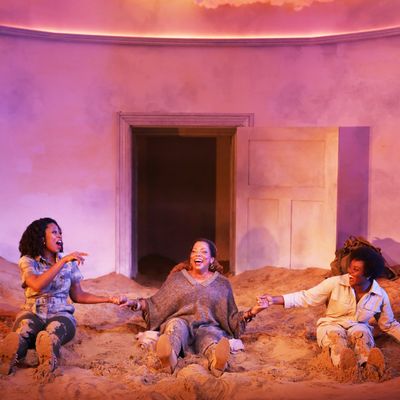
In Charly Evon Simpson’s neoabsurdist comedy sandblasted, the playwright imagines that an unexplained leprosy has started to strike young Black women. Their skin just doesn’t hold together like it used to. Limbs drop off without warning; even doing a salt scrub in the shower is a risk. This new plague (men are just starting to hear about it) makes the women shrink from any touch; even a caress could cost them a finger. In the intermittently powerful sandblasted, two of these women — Angela (Brittany Bellizeare) and Odessa (Marinda Anderson) — have begged for advice from an older celebrity guru named Adah (Rolonda Watts) who seems impervious to the disease.
When the play begins, Adah has brought her two disciples into the desert (“here West someplace”), where she thinks the sand and blazing light might somehow bake them back into health. Adah is wise yet also sort of full of it, happy to proclaim the value of blueberries in the face of someone else’s physical and mental collapse. “Antioxidants!” she sings operatically, Oprahishly.
Designer Matt Saunders has built them a breathtaking desert-in-a-room set — doorways and windows filled halfway with dunes and a nearly real sky overhead, dotted with three-dimensional cotton-ball clouds. (Stacey Derosier’s lighting throbs at sunset intensity throughout.) The sandy expanse with trapped-but-cheerful women recalls Samuel Beckett’s Happy Days, but Simpson’s emptiness isn’t static. These women have come deliberately to the desert; they are also able to leave the desert. This is no existential Beckettian prison. For all the women’s casual modernity, they’ve traveled to the desert of medieval ascetics, of the Desert Fathers. This is the wilderness where you throw your weakest self away.
In her satire, Simpson targets both a country hostile to Black women’s well-being — Anderson’s character refers to maternal death statistics — and the industries that grow like rust on that hostility. Are you anxious? Sick? At risk of early death? Then there is a lifestyle influencer ready to sell you a wellness cure. Yet not everything Adah is offering comes in the form of pointless lotions and leafy greens. She does tell Odessa and Angela things they need to know (like how sweet it is to age), and when Odessa has a panic attack, she calms her. “You’re on the ground,” Adah says, as Odessa fizzes restlessly. “Know you are on the ground.” Is this hand-wavey or helpful? Kind of both. Some of what she says obeys Tricia Hersey’s “Rest Is Resistance” framework, which links racial and generational trauma and disrupted sleep. At Adah’s direction, Angela and Odessa nap in the sand, and it does them real good. The show is a little dozy itself; it’s that dedicated to rest and recuperation.
The sand of sandblasted is the play’s main image, enough so that it stops being a “setting” and starts becoming the meaning and texture of the parable itself. It drifts and sifts and scatters, as does Simpson’s story, which never coheres into a solid landscape. Scenes flash forward and backward in time (the friends’ first meeting with Adah comes quite late in the show), and the constant avowals of resilience and support start to seem exchangeable too. In her dialogue, which is laid out on the page as poetry but spoken as prose, Simpson likes a malleable vagueness that can contain opposites.
“Waiting is suffering,” says Adah, though later Angela cries, in revelatory tones, “Waiting can just be us, living!” The difference, Simpson says, is in the women’s togetherness — waiting isn’t so cruel if Black women link arms. But it’s not clear if they are talking about waiting for justice or waiting for a cure or waiting for the end of the world. After she builds a clever allegory about Black women’s health, Simpson’s sure touch slackens. There’s a vivid first scene, and then the play almost immediately begins to lose its urgency. The radical nature of self-care converts here into a message about relaxing and putting aside the need for answers. That kind of affirmational you are already thriving stuff may be salve for the soul, but it doesn’t convert into theatrical excitement.
The director, Summer L. Williams, therefore has to lean heavily on her cast for the show’s electricity — and they deliver. Both Bellizeare and Anderson crackle in their scenes with Angela’s brother Jamal (Andy Lucien), who rolls up every now and then to shake his head at their desperation. At one point, Jamal leans flirtatiously over a bar toward Odessa, and her shrinking refusal is both a hilarious swerve and a heartbreaking reminder of what overtaxed women have decided is beyond their touch. The main thrill is Watts, though, who is superb, winking and laughing and so swaggeringly charismatic that you’d follow her anywhere. (She’s been on New Yorkers’ televisions, doing news and talk and voice-overs, for a generation.) Her voice contains all the delicacy and warmth of the sand — when she speaks, you can almost hear grains rustling down a dune. The play is ambivalent, in the end, about wellness claims. If something doesn’t hurt, maybe it helps? Still, I wouldn’t trust a crystal with my health. Watts’s voice, though, is medicine; I’ve tried it, and it works.
Sandblasted is at the Vineyard Theatre through March 13.


